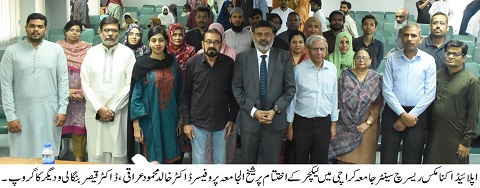Karachi (HNRW)-The renowned economist Dr Kaiser Bengali proposed a Charter of Economy for Sindh during a lecture session at the Rangoonwala Conference Hall of the Applied Economics Research Centre of the University of Karachi on Friday.
The KU AERC has invited Dr Kaiser Bengali to highlight the real problems of social and economic problems of the provinces and how people can come out of the current situation.
He observed that governments should secure the household and macro-economies, and proper flood management in Sindh. He advised priorities should be given to regional and urban development and work on finding new resources.
According to him, the Roti, Kapra aur Makaan, sums up the basic aspiration of the people, so that ensuring food security is the foremost duty of the state and gives the idea that most essential food items like wheat, pulses, onions, cooking oil, vegetables, and spices, all must be grown in the province and shared that these items are capable of being grown in Sindh.
He said that there should be no dependence on essential food imports and mentioned that imports are subject to the rising cost of foreign exchange, contribute to food inflation, and also adversely impact the lower-income groups disproportionately.
Dr Kaiser Bengali advised that acreage must be fixed district-wise to produce the required quantities and said that a necessary incentive structure should be instituted to provide growers with reasonable returns.
He observed that sugarcane is a coastal crop and said that its cultivation should be permitted in coastal districts only like Thatta, Sujawal, Badin, Tando Muhammad Khan, Tando Allahyar, and Hyderabad and mentioned that acreage released from sugarcane cultivation in all other districts which estimated at 200,000 hectares will become available for other essential crops.
He said that governments should ensure that people have a house, water supply, wastewater disposal, electricity and gas, and a clean, orderly neighborhood, besides providing employment opportunities as the overarching need for survival is employment. He said that employment can easily be generated by commodity sectors of the economy, primarily agriculture, and industry.
Dr Kaiser Bengali believes that super-floods have been affecting Sindh on average once every decade or so while the floods cause massive damage to public infrastructure, they also wipe out private assets of the displaced, accumulated over the years.
He said that both the ravages could be minimized and asked to remove all Katcha encroachments that distort the natural flow of water and obstruct the evacuation of flood waters. “Lay forest belt astride the River Indus to protect bunds from erosion, re-model the drainage network to allow flood/rainwater to escape towards the River Indus.”
He mentioned that Karachi and the rest of the province have different situations as Karachi is urban and relatively developed while the rest of the province is rural and underdeveloped. The population in the latter is dispersed in low-quality semi-urban centers and dilapidated villages.
He said that there is a requirement for the identification of Rural Growth Centres (RGC) and their prioritization for the allocation of resources for the development of economic and social infrastructure and facilities. Each of these RGCs must be equipped with quality housing, a high school and college for boys and girls, a hospital, a modern market center, and a small industrial park.
He informed the audience that cities are engines of growth, but they can only contribute if they are liveable and attract educated, enterprising youth to locate therein and lead the development process.
He stressed infrastructure works for agriculture, industry, housing, and flood protection, and urged to provide incentives for agriculture, industry, and social security. He witnessed that such measures will require significant resources, most of which can be mobilized by shifting allocations from non-development budget heads to priority development heads.
Dr Kaiser Bengali shared that a decentralized local government system with a fiscal distribution mechanism based on efficiency and equity criteria would help in achieving these targets.
On this occasion, the KU Vice Chancellor Professor Dr Khalid Mahmood Iraqi said that one of the reasons for our economic decline is that we avoid taking difficult decisions and there is a lack of continuity in the policies and that’s why we have negative effects on our economic structure.
He said that besides raising our voices for our rights at the government level, we should start looking for solutions ourselves, to reduce the problems being faced by the people of our beloved motherland.
He observed that we should also realize our responsibilities as a citizen to progress in the right direction.
